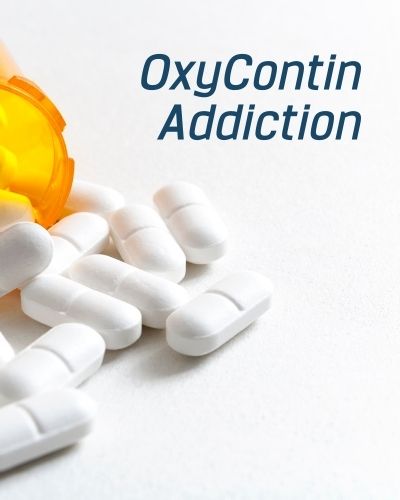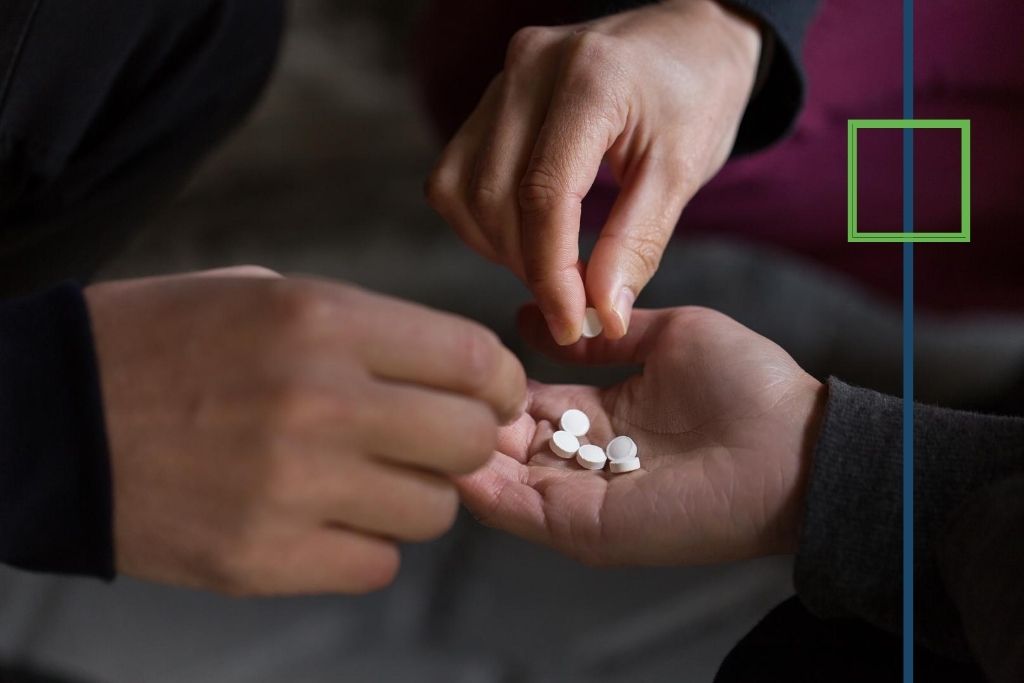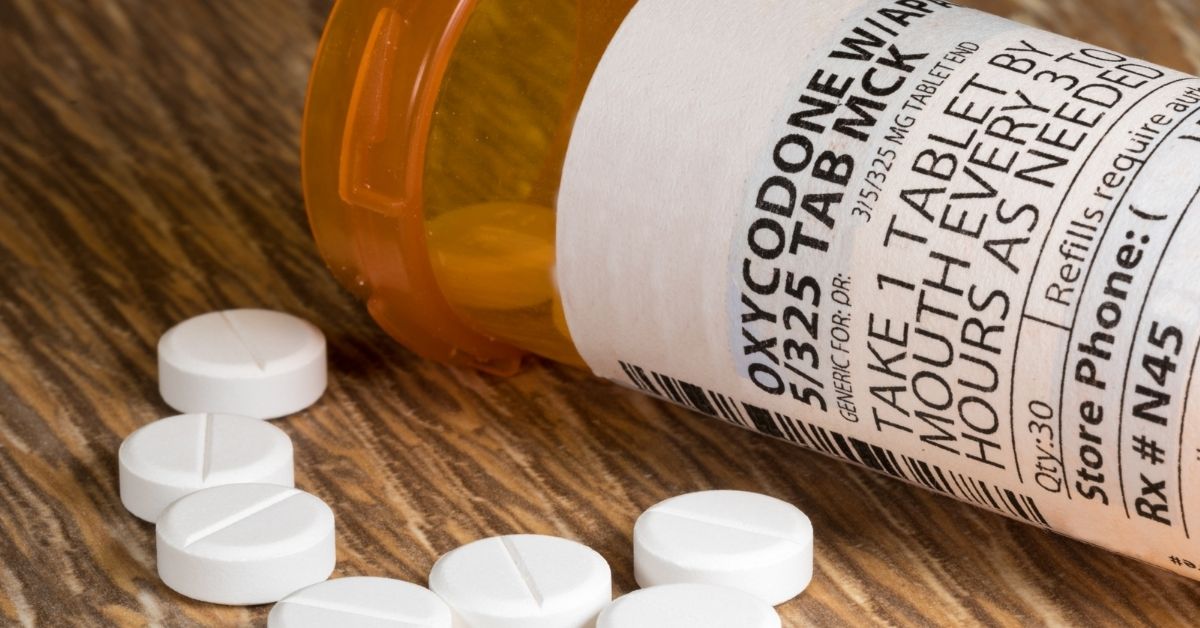What is Oxycodone?
Oxycodone is a common pain medication sold under the brand name OxyContin, among others. It is an opioid narcotic prescribed for moderate to severe pain and is sometimes formulated in combination with acetaminophen (Percocet) or aspirin (Percodan). The extremely addictive nature of oxycodone and other opioids has created an epidemic of opioid overdoses and deaths across the US. In 2019, nearly 50,000 people in the United States died from opioid overdoses. The CDC currently estimates more than 1000 emergency department visits daily related to the misuse of opioids and about 91 opioid overdose deaths every day.
Oxycodone is abused orally or intravenously. The tablets are crushed and sniffed or dissolved in water and injected. Others heat a tablet that has been placed on a piece of foil and then inhale the vapors. Oxycodone products are in Schedule II of the Controlled Substances Act, meaning they had medical use and a high potential for addiction. Euphoria and feelings of relaxation are the most common effects of oxycodone on the brain, which explains its high potential for abuse.

What Is Oxycodone used for?
Oxycodone is most commonly used for things such as post-surgery recovery, broken bones, consistent pain, and cancer-related pain due to its powerful ability to relieve pain. It is usually prescribed by physicians in tablet form to be taken orally. To prevent OxyContin tablets from being injected by individuals who misuse them, they were reformulated in 2014. The tablets are now resistant to crushing and become a thick gel when added to water. They also have controlled release properties, even as a gel.

Get Your Life Back
Find Hope & Recovery. Get Safe Comfortable Detox, Addiction Rehab & Mental Health Dual Diagnosis High-Quality Care at the We Level Up Treatment Centers Network.
Hotline (877) 378-4154Is Oxycodone Addictive?
Yes, people who use the drug may quickly build up a tolerance. When a tolerance has been built, the drug dosage the person usually takes no longer has the desired effect. So the person using Oxycodone will often have to keep taking more and more of the drug in order to feel high.
Oxycodone addiction can happen quickly. When in pill form, it’s designed to be a time-released pain reliever that can effectively manage pain over an extended period of time. It is most often prescribed to manage short-term severe pain. However, if taken more often than prescribed, crushed up and snorted, or injected in liquid form, the time-release mechanism is broken down. Abusing the drug-using any of these methods greatly increases the likelihood of developing an addiction.
Oxycodone Treatment in New Jersey
Oxycodone treatment in New Jersey can be a difficult and daunting task. There are several Oxycodone detox in New Jersey programs that offer different methods of combating this growing problem. But it is important for you as the patient to find one which will work best with your personal needs! Oxycodone detox in new jersey organizations may utilize medication-based replacements instead or even alongside therapy sessions. While oxycodone treatment in New Jersey rehab treatments may focus more heavily on counseling and support groups. Call us to learn more about what’s most suitable for your situation. Before deciding what’s the right fit just based on online reviews alone. Because no two patients seem exactly alike when there are dual diagnosis and or other behavioral health underlying problems driving the addictive behaviors.
Causes of Oxycodone Addiction
- Prescribed for a medical procedure. It is possible to become addicted to oxycodone after being prescribed the drug for pain management after surgery or an accident. Even if you take the drug as prescribed, you can develop a dependence.
- Genetics. A family history of addiction puts a person at greater risk even when they are using medication appropriately. Always let your physician or prescriber know if you have a family history of addiction or have previously been treated for addiction.
- Misuse. Some people report becoming addicted to oxycodone because they took someone else’s pills in an effort to alter their mood. This is a misuse of medication and is also against the law.
Many people wonder, how addictive is oxycodone? The answer is simply that oxycodone affects everyone differently. One person may become addicted while another won’t. This is one reason why it is important to work closely with your doctor if you are given oxycodone for pain management.
Get Help. Get Better. Get Your Life Back.
Searching for Accredited Drug & Alcohol Rehab Centers Near You? Or Mental Health Support?
Even if you have failed previously, relapsed, or are in a difficult crisis, we stand ready to support you. Our trusted behavioral health specialists will not give up on you. Call us when you feel ready or want someone to speak to about therapy alternatives to change your life. Even if we cannot assist you, we will lead you wherever you can get support. There is no obligation. Call our hotline today.
FREE Addiction Hotline – Call 24/7Oxycodone Addiction Symptoms
Oxycodone abuse can quickly lead to addiction. There is a host of physical, psychological, and behavioral signs and symptoms of oxycodone addiction, such as:
- Itching
- Constipation
- Dry mouth
- Hallucinations
- Abnormal thoughts
- Dilated pupils (during withdrawal)
- Diarrhea (during withdrawal)
- Poor grooming or lack of hygiene
- Becoming secretive about one’s whereabouts
- Being in possession of multiple prescription bottles from different doctors and pharmacies
- Drugged driving
Cravings
It’s tempting to dismiss oxycodone addiction as a personal choice, perhaps even a moral failing. After all, addiction causes a host of severe problems. But for addicts, it’s the cravings that keep them coming back for more.
Tolerance
Your body reacts to mind-altering substances by subtly changing the way you react to them, steadily reducing the intensity of the high you experience. Most users react to tolerance by steadily upping their dose, exposing them to the dangers of an accidental overdose, not to mention chemical dependency.
Comfortable Facilities & Amenities
High-Quality Addiction & Mental Health Rehabilitation Treatment
Rehab Centers TourRenowned Addiction Centers. Serene Private Facilities. Inpatient rehab programs vary.
Addiction Helpline (877) 378-4154Proven recovery success experience, backed by a Team w/ History of:
15+
Years of Unified Experience
100s
5-Star Reviews Across Our Centers
10K
Recovery Success Stories Across Our Network
- Low Patient to Therapist Ratio
- Onsite Medical Detox Center
- Comprehensive Dual-Diagnosis Treatment
- Complimentary Family & Alumni Programs
- Coaching, Recovery & Personal Development Events
Dependence
Dependency is the process whereby your body becomes physically dependent on oxycodone. When you attempt to stop using, you may experience unpleasant withdrawal symptoms as your body does everything in its power to get you to use. Because oxycodone is an opiate, the chemical dependency it can cause is unusually intense.
Withdrawal
Withdrawal is an intense physical and psychological experience that makes it nearly impossible to focus on anything else. Withdrawal is more than just a drug craving. It’s an intense physical and psychological experience that makes it nearly impossible to focus on anything else. Oxycodone and, indeed, most opiate withdrawal can consist of symptoms such as:
- Intense body aches and pains.
- Gastrointestinal distress.
The uncomfortable symptoms of oxycodone withdrawal are what keep many users hooked, even in the face of painful Oxycodone addiction-related consequences.
How long does it take to get addicted to oxycodone?
Your body breaks down oxycodone in the liver into noroxycodone, oxymorphone, and noroxymorphone. These are then excreted by the kidneys into the urine. The half-life of oxycodone, which refers to the amount of time it takes half the drug to be effectively eliminated from your body, is about 3.2 hours; the half-life for the time-released version (OxyContin) is about 4.5 hours.
Oxycodone’s action is effectively eliminated from the blood in 22.5 hours. For most people, the effects of the drug will be completely worn off after 24 hours. However, the drug remains detectable in the body for much longer, even after its effects have worn off.
Oxycodone will be detected by typical employment, medical, and forensic “drugs of abuse” screening tests. With a home testing kit, someone who has taken oxycodone will start to test positive for the drug within one to three hours, and the result will continue to be positive for one to two days, according to the Food and Drug Administration (FDA).

The following is an estimated range of times, or detection windows, during which oxycodone can be detected by various testing methods.
Urine – Oxycodone is detectable in a urine test for three to four days after the last dose. A standard urine drug screen usually does not test for oxycodone, so additional tests must be used to detect the presence of the drug.
Blood – In blood tests, the drug is detectable for up to 24 hours.
Saliva – Oxycodone can also be detected by a saliva test one to four days after use.
Hair – The drug can be detected by a hair follicle test for a much longer period of time than other test types—up to 90 days.
World-class, Accredited, 5-Star Reviewed, Effective Addiction & Mental Health Programs. Complete Behavioral Health Inpatient Rehab, Detox plus Co-occuring Disorders Therapy.
CALL (877) 378-4154End the Addiction Pain. End the Emotional Rollercoaster. Get Your Life Back. Start Drug, Alcohol & Dual Diagnosis Mental Health Treatment Now. Get Free No-obligation Guidance by Substance Abuse Specialists Who Understand Addiction & Mental Health Recovery & Know How to Help.
Oxycodone Abuse Treatments
Prescription Drug Abuse Treatment NJ
There is a strong link between mental health and prescription drug abuse. Individuals who struggle with mood disorders like depression and anxiety are more susceptible to developing an addiction to drugs or alcohol, often to self-medicate symptoms of their underlying mental health condition. These co-occurring disorders can make each other worse without proper treatment.
To determine the most effective ways to treat polysubstance, it’s crucial to first get an accurate assessment of all the symptoms. When the symptoms have been evaluated by a mental health professional, it may be determined that another form of mental condition is present and needs a particular type of treatment. Very often, some combination of psychotherapy, medication, and/or lifestyle changes are effective for coping with functional.
Detox Treatment in New Jersey Rehab Center
The first step in treatment is detoxification. It will help you navigate the complicated withdrawal process, but it doesn’t address patterns of thought and behavior that contribute to drug abuse. Various treatment approaches and settings can help provide the ongoing support necessary to maintain long-term sobriety after you complete detox.
Cravings are very common during detox and can be challenging to overcome. This often leads to relapse. Constant medical care provided during inpatient treatment helps prevent relapse. Clinicians can provide necessary medication and medical expertise to lessen cravings and the effects of withdrawals.
Psychotherapy
Several different modalities of psychotherapy have been used in the treatment of depression, including:
- Cognitive Behavioral Therapy (CBT) – is an effective treatment that involves making changes in both the patterns of negative thoughts and the behavioral routines which are affecting the daily life of the depressed person for various forms of depression.
- Dialectical Behavioral Therapy – is a comprehensive mental health and substance abuse treatment program whose ultimate goal is to aid patients in their efforts to build a life worth living. The main goal of DBT is to help a person develop what is referred to as a “clear mind.”
- Person-Centered Therapy – is a strategy that allows and encourages clients to understand and resolve their concerns in a safe, supportive environment.
Dual Diagnosis Treatment Centers New Jersey
Substance abuse and mental health disorders often co-occur. In many cases, traumatic experiences can result in a mental health disorder and substance abuse. Dual diagnosis programs in New Jersey treat both of these issues together. The best approach for the treatment of dual diagnosis is an integrated system. In this strategy, both the substance abuse problem and the mental disorder are treated simultaneously. Regardless of which diagnosis (mental health or substance abuse problem) came first, long-term recovery will depend largely on the treatment for both disorders done by the same team or provider.
Medication-Assisted Treatments
Medication-Assisted Treatments (MAT) for substance use disorders and mental health disorders are commonly used in conjunction with one another. This includes the use of medications and other medical procedures. During your rehab, the staff from your treatment facility will help you identify what caused your addiction and teach you skills that will help you change your behavior patterns and challenge the negative thoughts that led to your addiction. Sometimes, the pressures and problems in your life lead you to rely on substances to help you forget about them momentarily.
Now that we’ve answered the question ”is oxycodone addictive” and learned about its addictive properties and the risks that come along with its abuse. It is important to reach out for professional help if you or a loved one are struggling with long-term Oxycodone side effects and addiction. Contact one of our helpful treatment specialists today. We Level Up rehab center in New Jersey can provide information on dual diagnosis and detox programs that may fit your specific needs.

Experience Transformative Recovery at the We Level Up Treatment Center.
See our authentic success stories. Get inspired. Get the help you deserve.



Start a New Life
Begin with a free call to an addiction & behavioral health treatment advisor. Learn more about our dual-diagnosis programs. The We Level Up treatment center network delivers various recovery programs at each treatment facility. Call to learn more.
- Personalized Care
- Caring Accountable Staff
- Comfortable Amenities
- Licensed & Accredited
- Renowned w/ 5-Star Reviews

